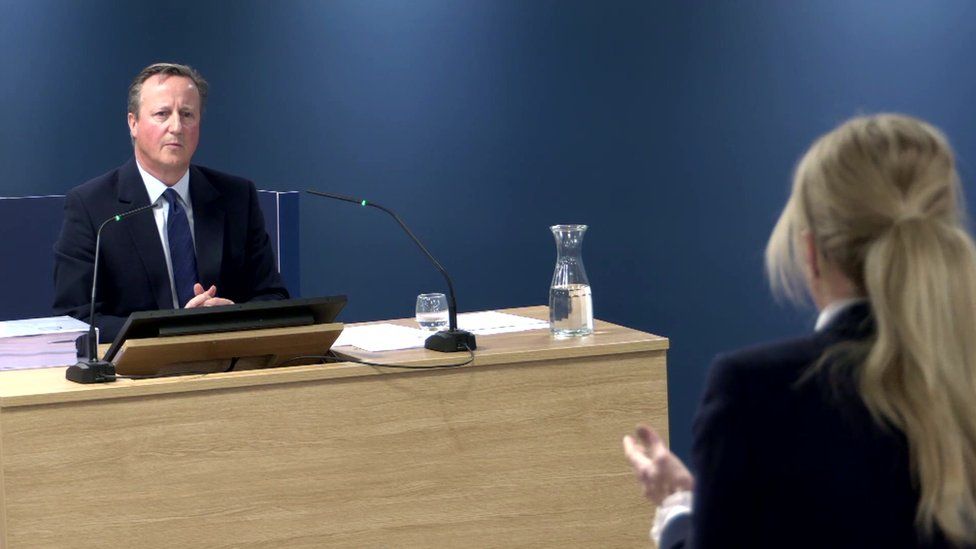Covid Inquiry: Mistake not to consider range of pandemics - David Cameron
- Published

Former Prime Minister David Cameron has said it was a "mistake" not to consider different types of diseases when preparing for future pandemics.
Giving evidence to the Covid Inquiry, Mr Cameron said "group think" meant his government did not focus enough on pandemics other than flu.
He also denied that his government's austerity policies damaged the UK's ability to cope with Covid.
The inquiry is currently considering preparedness ahead of the pandemic.
George Osborne and Jeremy Hunt, the chancellor and health secretary under Mr Cameron, will give evidence to the inquiry later this week.
Questioned by the inquiry's lawyer Kate Blackwell KC, Mr Cameron said: "Much more time was spent on pandemic flu and the dangers of pandemic flu rather than on potential pandemics of other, more respiratory diseases, like Covid turned out to be.
"This is so important - so many consequences followed from that."
The Conservative former leader said that on becoming prime minister he had sought to improve the UK's planning for risks by changing government structures, including by setting up a National Security Council.
However, he added that there was "always a danger of group think - perhaps that is what is happening here".
"I think the failing was not to ask more questions about asymptomatic transmission."
The Inquiry also heard from Sir Chris Wormald, permanent secretary at the Department of Health and Social Care (DHSC).
He, too, was asked about the government's focus on influenza preparations in its pandemic-planning.
"The approach taken was essentially ready for flu, ready for anything," he said.
Clara Swinson, who has headed up the DHSC's global health division since 2016, also spoke during Monday's hearing.
Referring to a UK-wide pandemic strategy, she said "there would've been some areas that were worth updating", since the only one was from 2011.
Turning to the focus on influenza, she added: "We had reflected in the new pandemic portfolio a recognition that we would like the strategy to be along all of the different routes of transmission."
Asked whether this was a mistake in hindsight, Ms Swinson said she thought it was "a reasonable decision at the time".
Mr Cameron was also pressed on whether his austerity policies hampered the UK's resilience when facing the pandemic.
At a hearing held last week, Sir Michael Marmot, a professor of epidemiology at University College London that the UK had entered the coronavirus pandemic with "depleted" public services.
Mr Cameron said he didn't accept that description and defended the austerity drive overseen by his government.
He said it was needed to get the public finances in order and without doing so there would have been less money for the NHS.
"Your health system is only as strong as your economy - one pays for the other."
He also pointed out that while other public services were cut, the NHS was actually protected by his government.
During his premiership, the NHS budget rose by an average of 1% to 2% after inflation.
However, this compares to an average of 4% during the rest of the health service's history - so while the budget did rise, the figure still represented a squeeze overall.
And it is a major reason why waiting times have worsened and the UK has fewer staff and beds per head than many other western European countries.
Other areas of health spending - such as training and public health - were not protected.
However, it is worth noting the Conservatives were not alone in advocating this approach. At both the 2010 and 2015 elections Labour was not promising significantly more for the NHS.
What is the UK Covid-19 inquiry?
It is about going through what happened and learning lessons
No-one will be found guilty or innocent
Any recommendations made do not have to be adopted by governments
The inquiry has no formal deadline but is due to hold public hearings until 2026
Scotland is holding a separate inquiry in addition to the wider UK one
Related Topics
- Published16 June 2023
- Published3 days ago
- Published6 June 2023